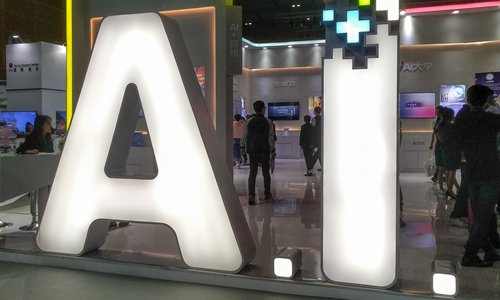
A booth of AI technology at the 6th China Electronic Information Expo held in Shenzhen, South China's Guangdong Province. Photo: VCG
Chinese universities nationwide added 37 new undergraduate majors, one-third of which are related to electronic information and artificial intelligence (AI), in line with the job market and development needs, experts said.
As all 31 provincial-level regions involved in the gaokao have released their scores and unveiled the undergraduate admission bar, it is time that incoming freshmen file their college application forms. According to the latest undergraduate major catalog published by the Ministry of Education (MoE), a total of 37 majors have been included by 43 institutes for the first time in 2021.
About one-third of these newly approved majors are related to electronic information and AI. These majors include intelligent mining, intelligent transportation, the energy internet, flexible electronics, and intelligent vehicle technology.
In recent years, many students enter a university program with a broad base of study, and after one or two years of basic courses, they can then decide on a more detailed and specific major, observers noted.
Among the 37 new majors, 12 belong to the humanities, arts and social sciences, but that's still far fewer than the number of additional majors in science and technology, triggering concern from some students and netizens. But experts pointed out that the MoE's decision is in line with job market.
"It's harder for China's liberal arts graduates to find jobs than for their science and technology classmates," Xiong Bingqi, director of the 21st Century Education Research Institute in Beijing, told the Global Times. "This is also an important reason why universities do not increase the enrollment of liberal arts majors."
Xiong pointed out that the decision is also related to China's urgent need for talent in related fields.
"China lacks core technology in some high-tech fields and suffers the bottleneck problem as China's development faces technology blockade launched by the West. Chinese higher education is also currently working to address this problem and train more relevant talent," Xiong noted.
The MoE also suggested that universities should improve the channels and ways of information dissemination related to the gaokao, and fully use information technology to provide candidates with various forms of guidance for the application process.
All regions are required to carry out application policy training covering all teachers and students.
Xiong pointed out that over the years, there have been cases where students have achieved excellent results in the gaokao but failed to get into their desired school due to weak applications.

